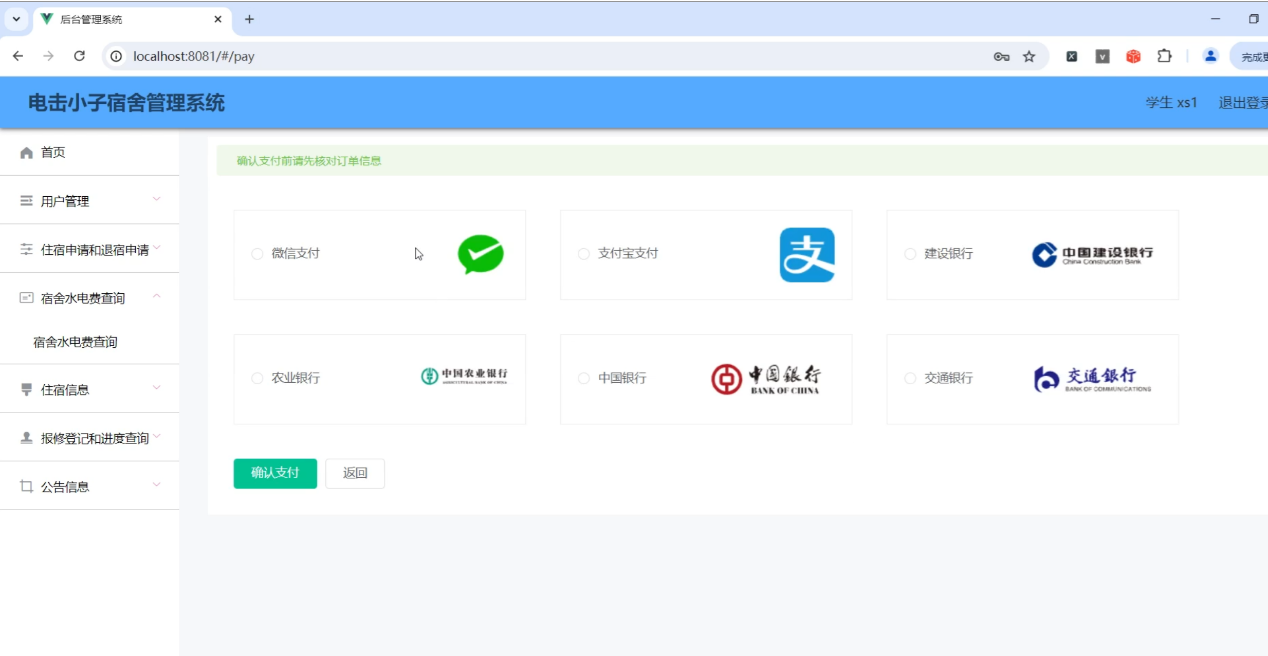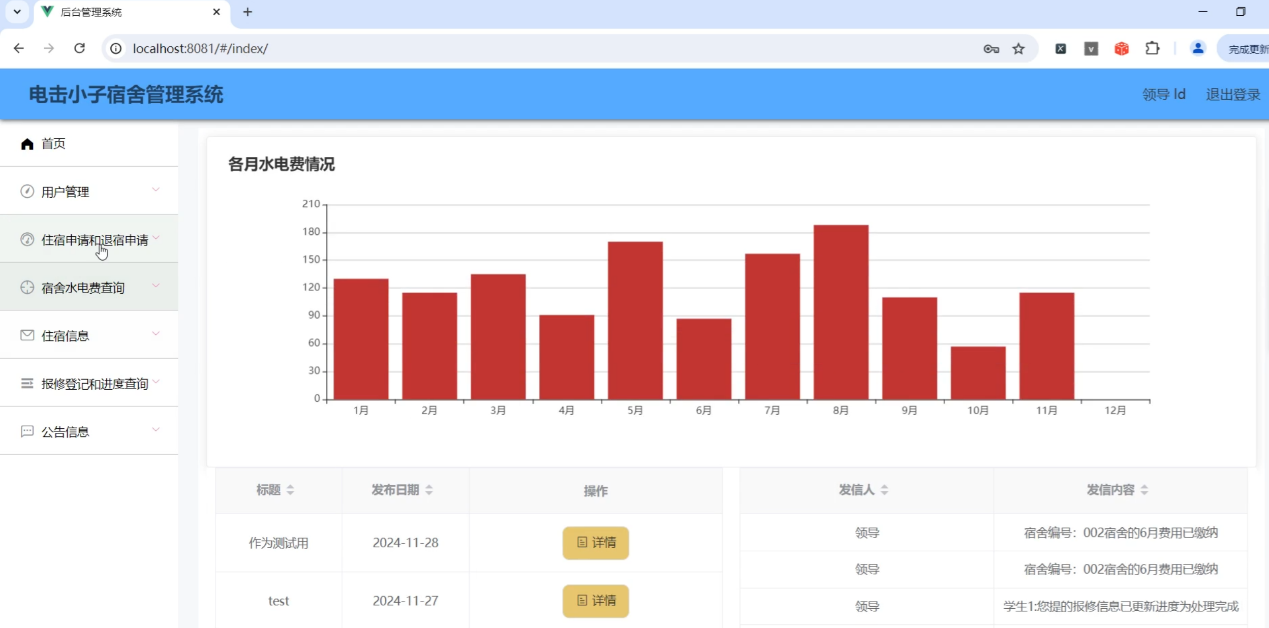174
社区成员
 发帖
发帖 与我相关
与我相关 我的任务
我的任务 分享
分享Beta Spring Summary for the Electro Boy Dormitory Management System
|
Course for This Assignment |
2401_MU_SE_EE308 |
|
Where are the requirements for this assignment? |
Teamwork—Beta Sprint |
|
Team Name |
Electro Boy |
|
The goal of this Assignment |
Beta sprint summary essay |
CONTENT
1. Project Overview
The Electro Boy Dormitory Management System project aims to revolutionize dormitory management through technology. It focuses on enhancing dormitory living experiences by integrating various functionalities that cater to the needs of students, administrators, and dormitory staff. The project addresses key issues such as payment processing, user interface (UI) and user experience (UX) optimization, system security, and overall system performance.
2. Project Content and Beta Phase Goals
2.1 Functional Improvements and Additions
During the Beta phase, the Electro Boy team concentrated on enhancing existing features and introducing new ones to enrich the dormitory management system. Key functional improvements include the integration of payment gateways, which has streamlined the payment process for users. Additionally, personalized payment options have been implemented, offering users convenience based on their preferences and historical behaviors. Furthermore, the system now supports multilingual and barrier-free functionalities, making it more inclusive and user-friendly.
2.2 Testing and Debugging
Comprehensive testing was a cornerstone of the Beta phase. The team conducted rigorous functional testing to ensure that all new and enhanced features operate as intended. Performance testing was also carried out to measure the system's responsiveness and efficiency under various loads. Security testing was particularly emphasized to safeguard against potential threats and vulnerabilities, ensuring a safe and secure environment for users.
2.3 User Experience Research
To deeply understand user needs and expectations, the team engaged in extensive user research. This included surveys and in-depth interviews with students and dormitory staff, providing valuable insights into the system's strengths and areas for improvement. The feedback collected guided the team in refining the UI/UX, making the system more intuitive and user-centric.
3. Specific Works During Beta Iteration
3.1 Sprint Work Overview
Each Sprint cycle within the Beta iteration witnessed significant progress. The first Sprint focused on integrating the payment gateway and laying the groundwork for future functionalities. Subsequent Sprints saw the deep optimization of user experience, the addition of personalized payment options, and the enhancement of system security.


3.2 Technical Implementation and Optimization
Technically, the team implemented intelligent recommendation algorithms that suggest suitable payment methods and promotions based on users' historical behaviors. This innovation enhances the user experience by providing tailored suggestions. Furthermore, the system's accessibility design was deepened, ensuring that it is usable by a broader audience, including those with disabilities.
3.3 Team Collaboration and Time Management
The Electro Boy team demonstrated exceptional collaboration and communication skills throughout the Beta iteration. Regular SCRUM meetings were held to align on goals, address challenges, and ensure progress. Effective time management ensured that tasks were completed on schedule, contributing to the project's timely delivery.
|
Member |
Task Description |
|
Li Mingqi |
responsible for designing the system architecture to ensure its overall stability and scalability. This involved considering the integration and compatibility of multiple functional modules. |
|
Chen Yuyan |
In charge of front-end interface development, including user interface design and responsive design. Also worked on enhancing RBAC for user permissions and security. |
|
Ding Qingye |
responsible for back-end development, including database design and API interface development. He integrated Alipay and WeChat Pay APIs and performed debugging. |
|
Zhang Aoyu |
He developed student function modules, such as dormitory application, check-out, and fee inquiry. He also worked on developing real-time notifications for payment status updates. |
|
Chen Shitao |
He developed function modules for dormitory administrators and maintenance personnel, including repair task management and dormitory inspection. He added user-friendly error messages and troubleshooting guides for payment failures. |
|
Wang Gaozhengyi |
He implemented scheduled announcements and supported multimedia attachments. His other contributions included optimizing system functions and enhancing user experience. |
|
Chen Zeyun |
He was responsible for developing the message notification system, including SMS and email notifications. He improved the interface to intuitively display tasks, events, and announcements. |
|
Zhang Yidong |
He developed the real-time announcement release function. He also has involved providing technical support and resolving technical issues. |
|
Zhu Rui |
He developed the system rights management functionality. He worked on introducing security measures such as two-factor authentication and enhancing sensitive data encryption. |
|
Xiao Mingxuan |
He conducted full system testing and resolved issues across all modules. His role focused on ensuring the quality and reliability of the system through comprehensive testing. |
|
LI Qi |
He finalized technical documentation and gathered user feedback for improvements. Project Coordination: His responsibilities have also included coordinating with other team members and ensuring the project progressed smoothly. |
4. User Research and Feedback
4.1 User Surveys and Feedback Collection
To gauge user satisfaction and gather suggestions for future improvements, the team conducted extensive user surveys and interviews. Participants included both students and dormitory staff, providing a diverse range of perspectives.
4.2 Feedback Analysis and Application
The collected feedback was meticulously analyzed to extract valuable insights. These insights were then incorporated into the system's subsequent developments. For instance, based on user feedback, the team prioritized optimizing page responsiveness and resolving user lag issues, significantly enhancing the overall user experience.
In conclusion, the Beta iteration of the Electro Boy Dormitory Management System has been a resounding success. Through focused functional improvements, rigorous testing, extensive user research, and effective team collaboration, the project has delivered a robust, secure, and user-centric system. Looking ahead, the team will continue to iterate and refine the system based on ongoing user feedback, ensuring it remains at the forefront of dormitory management technology.